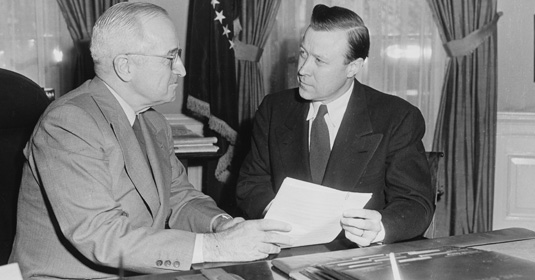
Seventy years ago, from November 21, 1945,* until March 13, 1946 (113 days), the CIO-affiliated United Automobile Workers (UAW), organized 320,000 hourly workers in 96 plants to launch a nationwide strike against the General Motors Corporation. It was “the longest strike against a major manufacturer” that the UAW had yet seen, and it was also “the longest national GM strike in its history,” according to labor historian Nelson Lichtenstein.
As director of the UAW’s General Motors Department, i.e., coordinator of union relations with GM,Walter Reuther put forth the demands of the strikers: A 30 percent increase in wages and a hold on product prices.
The GM strike was one of a number of large-scale labor actions in the immediate aftermath of World War II, when labor generally endorsed a “no strike” pledge to aid the war effort. Pent-up demands now emerged into the open. Reuther arguedthat the high productivity of modern industrialism offered the potential for permanent prosperity for the American people. But instead the UAW saw GM ownership using their power to maximize profits, creating “planned scarcity” (therefore driving up product prices) while cutting jobs. Such a system caused a cycle of problems, among them that Americans could not even purchase the limited goods they produced.
An anemic economy meant that social needs would go unaddressed, and infrastructural progress, such new schools and hospitals, roads, bridges, and homes, would not be affordable in an austerity economy. Walter Reuther’s statement in 1944 explained his central thesis: He said, “‘It is my determined belief that there can be no permanent prosperity…so long as the controls of production remain in the hands of a privileged minority.”
In such an economy, corporate elites exerted great power over price controls, wage settings, and overall decision making. Reuther and the UAW advocated the democratization of production, which showed through his demands in the UAW-GM bargain.
The union demanded a 30 percent increase in hourly wages and a halt on automobile prices, which GM rejected, arguing that they couldn’t afford the wage increase and needed to control the right to determine pricing. Reuther’s subsequent proposal allowedfor a smaller increase in wages if GM wouldopen its books for inspection. GM hardened its stance, going a step further by declaring Reuther’s demands to be “un-American and socialist.”Reuther had received similar criticisms in the past.
The possibility for success declined by the beginning of the year 1946, when the United Steelworkers and the United Electrical Workers accepted 17.5 percent wage increases. In the final contract with GM, UAW workers agreed to a raise of 18.5 cents an hour (17.5 percent), paid vacations, and overtime. The union gained no role in determining product pricing.
Although the strike was only partially successful, it did point the way toward the normalization of a decent working-class standard of living, with price controls geared toward maintaining the economic situation of the nation as a whole in the most socially beneficial way, honoring the sacrifices Americans made to defeat fascism.
In part owing to Walter Reuther leadership of this long strike, he was made president of the UAW in 1946. The decades from the late 1940s until the mid-1970s are seen as the apogee of “middle-class” success, when union density rose to its highest level, and solid union contracts, combined with reforms such as Medicare and expanded voting rights, guaranteed a better future for our children.
*The Solidarity Forever 2015 Labor History Calendar cites Nov. 13 as the start date.
Adapted from Wikipedia.
Photo: Wikipedia (CC)












Comments